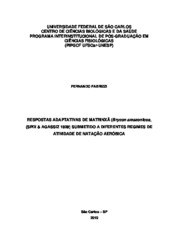Respostas adaptativas de matrinxã (Brycon amazonicos, (Spix & Agassiz 1829) submetido a diferentes regimes de atividade de natação aeróbica
Resumo
The exercise training has been highlighted by the effects that they produce directly on the animal physiology. In fishes, there is evidence that the practice of forced swimming brings improvements in growth rates, feed conversion and efficiency of nutrient use. This study evaluates the growth parameters, hematological and metabolic on Brycon amazonicus under different exercise during 30 days. In fishes subjected to aerobic swimming regimen was observed the same growth performance in all tested conditions and oligoglobulia and macrocytosis in fishes that underwent intermittent aerobic swimming activity. In fishes subjected to intermittent regimen of aerobic swimming at intervals activity / rest 12/12hs was observed better nutrient utilization, increase hepatic glycogen reserves, reduction of gluconeogenesis from amino acids, decreased the hepatic biosynthesis of lipids and low lactic fermentation. In conclusion, the forced swimming intermittent / home 12 /12hs regimen showed metabolic advantages over other swimming schemes to expand the range of exercise / rest so we can reassess the growth performance and to evaluate its advantages.
